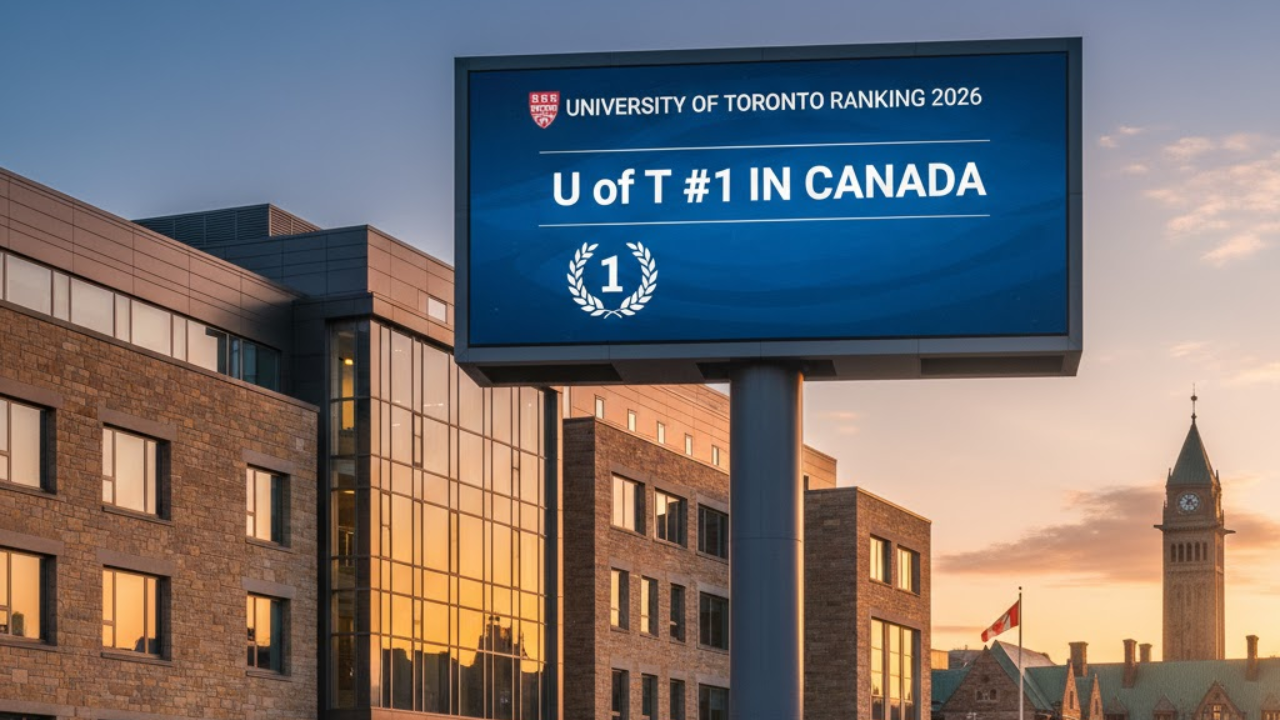
A Nutritionist’s Warm Guide to When to Enjoy Flaxs
Nutritionist Deepsikha Jain recommends 1–2 tablespoons of flaxseeds—morning, before meals or as a sn

The University of Toronto has achieved a remarkable milestone in the Times Higher Education World University Rankings 2026, securing first place in Canada and 21st in the world. This recognition reaffirms U of T’s long-standing reputation as a global leader in education, research, and innovation.
For years, the University of Toronto has served as a benchmark for academic excellence in Canada. Its continued presence among the world’s top 25 universities demonstrates a consistent ability to produce impactful research, attract top-tier faculty, and offer exceptional learning opportunities to students from around the world.
This article explores the details behind U of T’s ranking, the factors influencing its success, what the ranking means for students, researchers, and Canada as a whole, and how the institution continues to shape the global academic landscape.
The Times Higher Education (THE) World University Rankings are among the most respected global benchmarks for academic excellence. Each year, they evaluate thousands of universities based on data covering teaching, research, citations, international outlook, and industry income.
These rankings provide a comprehensive look at institutional performance and help students, researchers, and policymakers understand how universities compare across borders.
U of T’s position in 2026—first in Canada and 21st worldwide—shows not only consistency but also progress in areas that define world-class universities: impactful research, global partnerships, and an environment that nurtures innovation.
U of T’s strongest area remains its research environment, which encompasses research funding, infrastructure, publications, and collaborative projects. The university is home to some of the world’s most influential researchers, producing groundbreaking work in medicine, computer science, engineering, artificial intelligence, and social sciences.
The extensive network of research institutes and cross-disciplinary centers gives U of T the ability to take on large-scale global challenges — from climate change and public health to digital innovation and ethics in technology.
Citations measure how often a university’s research is referenced by scholars worldwide. A high citation score indicates strong global influence and academic credibility. The University of Toronto’s vast output of peer-reviewed papers and collaborations with leading institutions has positioned it as a global knowledge hub.
This impact is especially visible in fields such as neuroscience, immunology, and data science — areas where U of T researchers consistently publish in high-impact journals.
Teaching quality is a core component of THE’s evaluation, and U of T’s strong academic culture continues to attract top educators and students alike. The university’s commitment to small-group learning, advanced research integration into classrooms, and mentorship-driven graduate programs enhances its teaching performance metrics.
Student satisfaction surveys consistently highlight U of T’s academic rigor, diversity, and the opportunities it provides for undergraduate research and experiential learning.
The University of Toronto’s community is among the most diverse in North America. With tens of thousands of international students, scholars, and partnerships across more than 160 countries, U of T demonstrates a truly global outlook.
This internationalization strengthens academic collaboration, enriches classroom experiences, and builds a reputation for inclusivity that extends far beyond Canada.
U of T’s relationships with industry partners and startups contribute significantly to its overall ranking. The university has become a powerhouse for innovation and entrepreneurship through its programs at the MaRS Discovery District, the Vector Institute for Artificial Intelligence, and its numerous startup incubators.
These collaborations not only drive economic growth but also foster applied research and technology transfer, which THE considers in its evaluation criteria.
To understand the magnitude of U of T’s achievement, it helps to look at how THE evaluates universities. The ranking uses five primary pillars:
Teaching (30%) – The learning environment, including faculty credentials, student-to-staff ratio, and teaching reputation.
Research (30%) – Volume, income, and reputation for producing high-quality scholarship.
Citations (30%) – Influence and research impact measured through global citation data.
International Outlook (7.5%) – The proportion of international students, staff, and collaborative research.
Industry Income (2.5%) – Knowledge transfer and partnerships with commercial sectors.
By performing exceptionally across all five pillars, U of T demonstrated that it is not just a leading research university but a well-rounded institution excelling in teaching, engagement, and global collaboration.
While the University of Toronto tops the national list, Canada continues to perform strongly overall in global rankings. Other universities, such as the University of British Columbia, McGill University, McMaster University, and the University of Alberta, also earned positions in the global top 200.
Together, these institutions strengthen Canada’s academic reputation and demonstrate that the country continues to be an attractive destination for students and researchers seeking excellence in education.
U of T’s continued leadership, however, stems from its combination of scale, quality, and innovation. With more than 90,000 students, 700 undergraduate programs, and over $1.5 billion in annual research funding, it remains a central force in Canada’s knowledge economy.
For prospective students, rankings serve as an initial indicator of quality and prestige. Being part of a globally top-ranked university means access to cutting-edge facilities, world-class professors, and a highly diverse academic community.
Graduating from a top-25 university also enhances employability and global mobility, as employers and graduate schools recognize U of T’s rigorous academic standards.
A high global ranking amplifies visibility, attracting grants, collaborators, and top-tier faculty from around the world. For researchers, this means greater opportunities to participate in international projects and publish in impactful venues.
It also provides stronger institutional support for high-risk, high-reward research — the kind that drives scientific breakthroughs.
U of T’s achievement boosts Canada’s standing as a nation that values education, research, and inclusivity. It reinforces Canada’s position as a leader in higher education and innovation, especially in an era where global competition for talent is intense.
A strong academic ecosystem contributes not only to cultural and intellectual advancement but also to economic growth, entrepreneurship, and sustainable development.
U of T’s Faculty of Medicine, in partnership with several of the world’s top hospitals, is a global leader in clinical research, medical education, and biomedical innovation. Breakthroughs in neuroscience, oncology, and immunology continue to attract international recognition.
Home to the Vector Institute and several world-renowned AI researchers, U of T remains at the forefront of artificial intelligence, robotics, and data-driven innovation. Its work in deep learning and natural language processing has influenced the global tech industry.
U of T’s Faculty of Applied Science and Engineering consistently ranks among the top globally. Research in clean energy, infrastructure resilience, and advanced materials science helps position the university as a hub for sustainable innovation.
U of T’s contributions to the social sciences and humanities are equally significant. Its research on urban development, equity, ethics, and policy has informed international discussions on governance, justice, and human rights.
The global higher education landscape is more competitive than ever. Institutions in Asia, Europe, and the Middle East are making rapid strides in research investment and talent recruitment.
For U of T to maintain its position, it will need to continue emphasizing innovation, inclusivity, and sustainability. Areas such as climate science, digital transformation, and global health will play key roles in determining future rankings.
The university’s strategic plan, focused on interdisciplinary collaboration and responsible innovation, aligns well with these future priorities.
While rankings provide valuable benchmarks, they do not tell the full story of a university’s mission or impact. Education quality involves much more than quantitative data — it encompasses community engagement, student well-being, equity, and long-term contribution to society.
U of T’s leadership in areas like accessibility, social impact research, and public policy demonstrates that excellence extends beyond metrics. It’s about how knowledge is applied to improve lives globally.
Higher rank always means better education
Not necessarily. Rankings emphasize research output and reputation more than individual student experience.
Rankings are fixed indicators of quality
They are annual snapshots based on specific metrics, not permanent labels.
All top-ranked universities are similar
Each institution has its unique focus, culture, and academic strengths. U of T’s identity, for instance, is rooted in research intensity and public engagement.
Rankings ignore social responsibility
While global rankings emphasize quantitative data, the real test of a university’s worth lies in how it contributes to society — something U of T continues to prioritize through community partnerships and equity initiatives.
The University of Toronto’s 2026 ranking serves both as recognition and as a challenge. To remain competitive, U of T will likely:
Expand interdisciplinary research across fields such as climate technology, AI, and healthcare innovation.
Strengthen partnerships with international universities and industries.
Enhance student support systems and global mobility opportunities.
Continue investing in sustainable infrastructure and inclusive education.
As global education evolves, U of T’s focus on excellence, ethics, and equity will determine its long-term success.
Disclaimer:
This article is based on publicly available information and analysis of the Times Higher Education World University Rankings 2026. University rankings are subject to change based on updated data and methodology. Readers are encouraged to review official releases for the most current details.